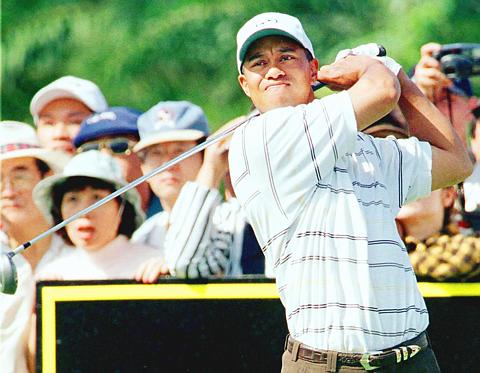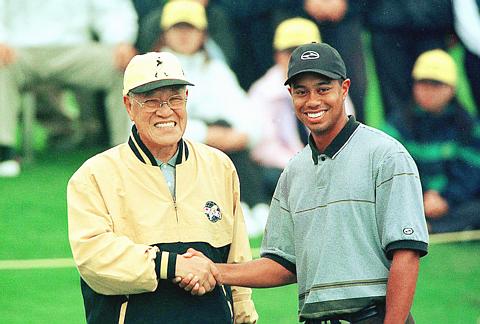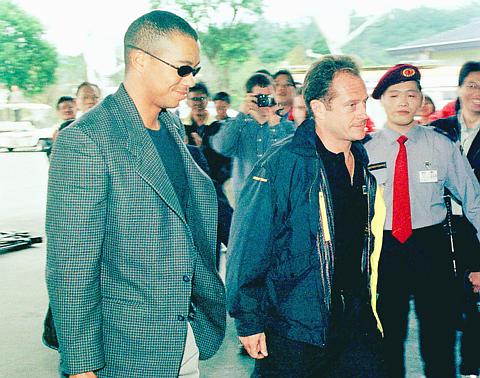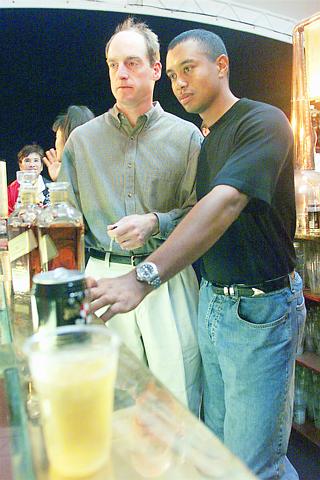It's nine o'clock in the morning and Tiger Woods is running late. The people waiting to see him, a small group of local Nike executives, their families and a handful of reporters, sit patiently in a small meeting room at the Ta Shee Country Club's Westin resort outside of Taipei.
These are not people who are usually kept waiting, but in light of the expected guest, their mood is more than forgiving.
As it should be, especially considering Woods' recent schedule. A win two days before at a tournament in Spain followed immediately by a 20-plus hour flight that saw stops in Dubai and Bangkok. And then, just hours after touching down in Taipei, the opening ceremonies for last week's Johnnie Walker Classic alongside President Lee-Teng-hui (

PHOTO: AFP
When Tiger finally strolls into the room, the crowd bursts into spontaneous applause. A group of kids at the front, all wearing Nike baseball hats, bellow out "Hello Tiger!" a line that had been well rehearsed before the golf star's arrival.
But as the applause ends, a strange thing happens. When Tiger walks to the small podium and takes the microphone and the floor, he looks like the most relaxed person in the room while everyone else seems stunned by his presence.
"Tigermania" has momentarily infected the room.

PHOTO: AFP
It's not until after a long, awkward silence that a girl asks a question.
"How can I be like you when I grow up?"
Woods' response is textbook, but sincere: "You need luck, dedication and, most of all, a love for what you're doing."

PHOTO: AP
It would seem that Woods, who at 23 is not only one of the most dominant golfers to ever wield a club, but also one of the most recognizable people on the planet, has followed his own advice.
"He's the best," confirms 10-year old Betty Wang when explaining why she came out to meet Woods. Not many people would argue with her. Shortly after turning pro, Woods first stunned the golf world in 1997 by running away with the Masters, arguably golf's most prestigious tournament. Since then he has been almost unstoppable, winning eight tournaments this season -- including one major, the PGA Championship -- and the last four that he has played in. While Woods seems to have adjusted and become comfortable with his status as a celebrity, he still turns fans and reporters who flock to see him on their heads.
And while Woods makes a splash everywhere he goes these days, the impact of his presence is magnified in a place like Taiwan where diplomatic isolation keeps many high-profile people away. The last visitor who caused such a stir was the Dalai Lama when he visited in 1997. And as stirs go, the one His Holiness caused in Taiwan was comparatively modest.

PHOTO: AFP
"Tiger is an interesting superstar," says Mark Steinberg, Woods' agent. "He isn't like a lot of other famous people who project an image and then act another way in private. He's himself all the time."
In the relatively few short years that Woods has occupied the spotlight, he's been known as an affable, light-hearted -- if incredibly determined -- and sincere person. It is a reputation that endears him to fans almost as much as his golf does and is a marked contrast to some other sports mega-stars.
As an example of Woods personality, Steinberg points to a 921 earthquake charity event that Tiger took part in. "Tiger wanted to do the right thing and he has been eager to do something for the earthquake victims," Steinberg says. "In the end we ended up auctioning off a golf bag and a club, each of which went for over US$400,000."

PHOTO: REUTERS
It's myriad events like these, combined with Woods pro-tour schedule and his desire to "do the right thing" that put incredible strain on his schedule and keep his team of handlers busy trying to satisfy the intense demand. "The requests I get for Tiger's time are endless," says Steinberg. "They pour in, literally, by the minute. Everybody's half-hour with Tiger is very important for them, but it is not necessarily as equally important for Tiger. This is why he can't sign every autograph. If he did, that's all he would do. He'd be an autograph signer instead of the world's best golfer."
Thirty-two-year-old Tsai Wen-chang, like many of Woods' fans, would cherish just five minutes with the golf legend but is almost as happy just to watch him play. "Tiger Woods is the greatest player ever and I can't believe he's in Taiwan," he says enthusiastically while waiting by the first tee to watch Woods tee off. "I can't wait to see him play. I'll follow for the whole 18."
Even Tiger's fellow golfers can, at times, become rattled by all the hype. "I was nervous playing in front of so many people," Wang Te-chang, a local Taiwanese golfer, said after playing the opening round of the tournament alongside Woods and US golfer Jim Furyk.
Wang hooked his drive off the first tee and later said, "I only settled down after playing a few shots, but even then, it was still hard."
But Furyk, a seasoned golfer who finished the first round ahead of Tiger, added that Woods causes a sensation anywhere he plays. "When Tiger gets done putting everybody rushes to see his next drive. It's like that in the US as well. Everybody wants to see him play and that is something that we are all getting accustomed to."
The result of all the hype and adulation sometimes makes competitions seem more like a circus than a golf tournament. "My favorite part of the day was this guy who appeared out of nowhere wearing a yellow hardhat," says Henry Gerarv, a scorekeeper assigned to Woods during the opening round. "He was this old guy who crossed the barrier and then just kept walking with Tiger. They told him to leave, but he just grunted and followed along for about five holes."
Taiwan's love of Tiger, however, has sometimes registered as a bogey with tournament director Peter Germans. After the first round of play on Thursday, he admonished spectators to heed requests to turn off mobile phones and to respect the players by not talking or snapping photos during players' swings.
Woods, however, who was forced to back off a few putts during his first round, seemed to take the noise factor and the enthusiasm of the fans in stride. "When Tiger goes someplace for the first time `Tigermania' is really at its peak," says Steinberg. "He's really more than a golfer -- he's a celebrity. So fans, especially fans who love golf, can get carried away, but the fans in Taiwan have been wonderful."
Out on the course things seem to be going fine for Woods. He has just scored a birdie and moved to 4-under par on the day. As he walks out onto the next tee the crowd is still jostling for a vantage point, eager to catch another glimpse of one of Tiger's famous drives.
He takes his driver from his caddie and places a ball on the tee. The crowd, now thousands strong, falls silent. The faraway call of birds is all that can be heard.
The drive comes like an explosion. A blend of beauty and power that sends the ball straight up the fairway, racing for the green, until it is swallowed up and lost in the evening mist. And as he bags his famed driver and begins walking, head up and alone down the center of the fairway, thousands of fans surge forward and give chase, flocking in Tiger's wake.

Desperate dads meet in car parks to exchange packets; exhausted parents slip it into their kids’ drinks; families wait months for prescriptions buy it “off label.” But is it worth the risk? “The first time I gave him a gummy, I thought, ‘Oh my God, have I killed him?’ He just passed out in front of the TV. That never happens.” Jen remembers giving her son, David, six, melatonin to help him sleep. She got them from a friend, a pediatrician who gave them to her own child. “It was sort of hilarious. She had half a tub of gummies,

June 23 to June 29 After capturing the walled city of Hsinchu on June 22, 1895, the Japanese hoped to quickly push south and seize control of Taiwan’s entire west coast — but their advance was stalled for more than a month. Not only did local Hakka fighters continue to cause them headaches, resistance forces even attempted to retake the city three times. “We had planned to occupy Anping (Tainan) and Takao (Kaohsiung) as soon as possible, but ever since we took Hsinchu, nearby bandits proclaiming to be ‘righteous people’ (義民) have been destroying train tracks and electrical cables, and gathering in villages

The wide-screen spectacle of Formula One gets a gleaming, rip-roaring workout in Joseph Kosinski’s F1, a fine-tuned machine of a movie that, in its most riveting racing scenes, approaches a kind of high-speed splendor. Kosinski, who last endeavored to put moviegoers in the seat of a fighter jet in Top Gun: Maverick, has moved to the open cockpits of Formula One with much the same affection, if not outright need, for speed. A lot of the same team is back. Jerry Bruckheimer produces. Ehren Kruger, a co-writer on Maverick, takes sole credit here. Hans Zimmer, a co-composer previously, supplies the thumping

Swooping low over the banks of a Nile River tributary, an aid flight run by retired American military officers released a stream of food-stuffed sacks over a town emptied by fighting in South Sudan, a country wracked by conflict. Last week’s air drop was the latest in a controversial development — private contracting firms led by former US intelligence officers and military veterans delivering aid to some of the world’s deadliest conflict zones, in operations organized with governments that are combatants in the conflicts. The moves are roiling the global aid community, which warns of a more militarized, politicized and profit-seeking trend